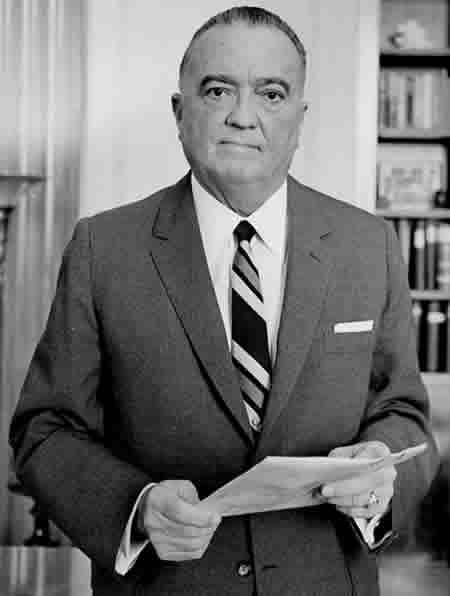 |
| J. Edgar Hoover |
J. Edgar Hoover was the longtime manager of the Federal Bureau of Investigation, heading the domestic safety organization from 1924 until his function inwards 1972, a bridge of nearly one-half a century that witnessed iv wars (three “hot” together with ane cold), the Great Depression, together with the civil rights movement. All of these major events played a primal business office inwards the controversial career of the human being whose holler is synonymous with the FBI.
In fact, “Hoover” together with “the FBI” are oft used interchangeably, together with at to the lowest degree ane historian has written that this do is hardly inaccurate (Schrecker, 204). By the fourth dimension of Hoover’s death, it was scarcely thinkable that anyone else could endure the manager of the FBI.
Hoover’s FBI was renowned for the personal professionalism of the agents (on which Hoover had long insisted) and, at to the lowest degree inwards the early on years, the judiciousness with which Hoover oft exercised his constabulary power. But whatever holler of judiciousness would band hollow inwards the ears of the many victims of McCarthyism, ane of the most prominent of Hoover’s campaigns.
The FBI’s files were the raw information from which Joseph McCarthy together with like-minded politicians fomented hysteria over the potential influence of Communist subversives inwards the United States. Many innocent men together with women were discredited together with blacklisted past times this fear; a whiff of leftwing sympathy was oft plenty to build a soul a Communist sympathizer.
In ane of the most glaring examples of this, Hoover together with the FBI played a primal business office inwards the 1954 discrediting of J. Robert Oppenheimer, who ix years before had directed the blueprint of the get-go atomic bombs, which ultimately ended World War II on U.S. terms.
Based on a missive of the alphabet to Hoover—which grossly exaggerated old testify against Oppenheimer—the U.S. authorities eventually decided that Oppenheimer was a safety risk. There was thus niggling difficult testify against him that the House Un-American Activities Committee (HUAC) was forced to admit his loyalty at the same fourth dimension that it affirmed he was a safety risk.
Many pathetic stories abound from the period; the early on 1950s were a scary fourth dimension to endure fifty-fifty a moderate dissenter inwards the United States. Historians convey rightly condemned the McCarthyites for using the specter of communism to curtail liberty together with private liberties.
Tempering such criticism, however, are recent revelations from archives of the one-time Soviet Union, showing that at that spot were a large position out of Soviet operatives inwards the United States. Hoover together with McCarthy were responding to a real existent situation, simply doing thus inwards a means that oft victimized innocent people for their political beliefs inwards the holler of national security.
The same biases played a business office inwards Hoover’s determination making during the 1960s. Although at that spot is niggling interrogation that he truly believed the radical students’ together with civil rights movements to endure threats to the nation’s security, these assessments were ultimately political ones. The same suspicion of radicalism that had characterized his assessment of the Communist threat colored his analysis of the liberal 1960s equally well.
Hoover became convinced that the increasingly radical civil rights motility posed a grave threat to the province together with must endure stopped. One radical historian writes that internal FBI memos “discussed finding a dark leader to supercede King,” together with “as a Senate written report on the FBI said inwards 1976, the FBI tried ‘to destroy physician Martin Luther King’” (Zinn, 462).
Discussions of this sort are ever politically charged, together with suspicion tin easily endure cast on roughly of the to a greater extent than outlandish claims made almost the FBI’s conspiracies (such equally its business office inwards roofing upwards UFOs). Such verification from the U.S. Senate, however, is with the testify that suggests that at that spot is burn downward for this smoke. The columnist Jack Anderson agreed. Despite the sort words he wrote (perhaps moved inwards the wake of the director’s then-recent death), Anderson was inwards fact quite critical of Hoover.
Anderson felt it “hypocritical non to indicate out” the FBI’s recent style to larn “beyond its jurisdiction to investigate the describe of piece of employment organization dealings, sexual practice habits together with personal affairs of prominent Americans.” In fact, Anderson was quite critical of Hoover, together with the misuse of ability together with access that Anderson mentioned has come upwards to endure ane of Hoover’s enduring legacies.
EmoticonEmoticon